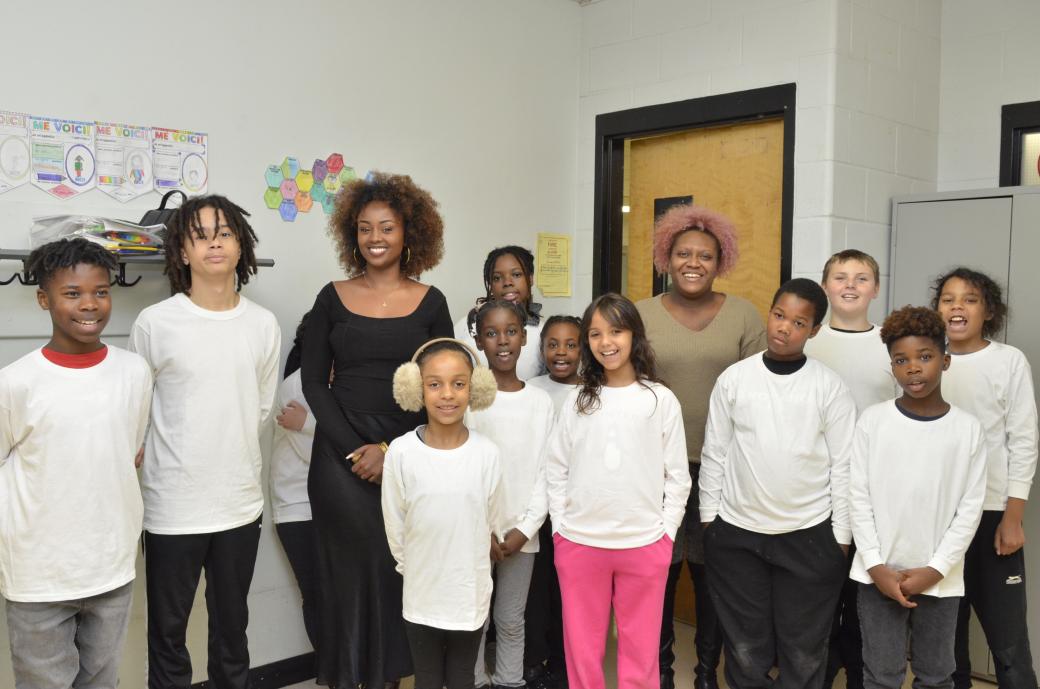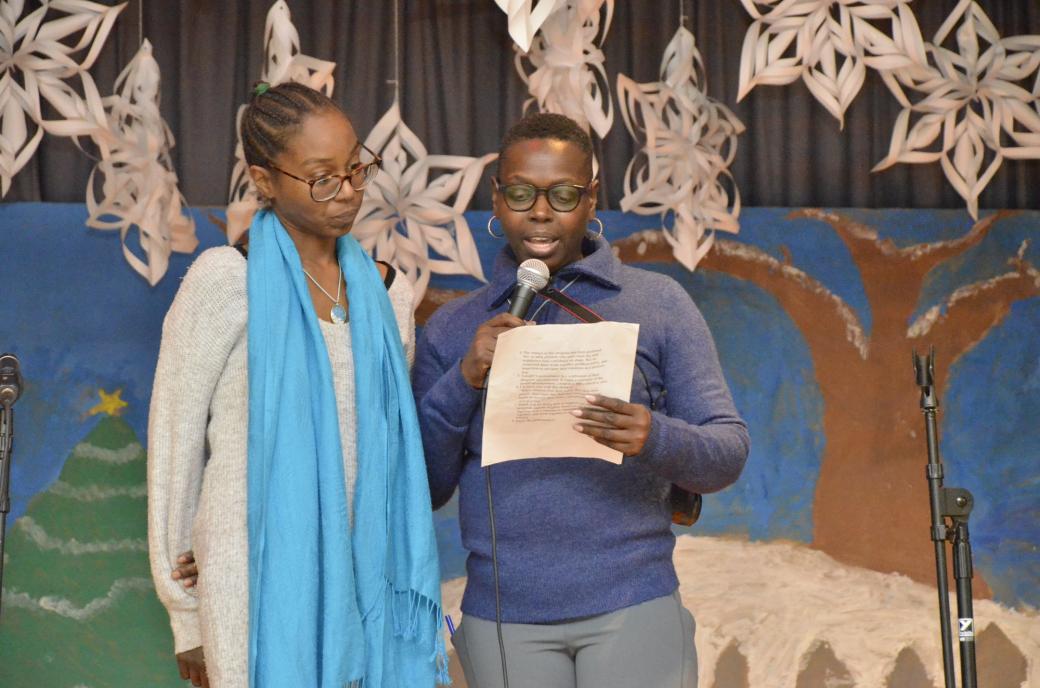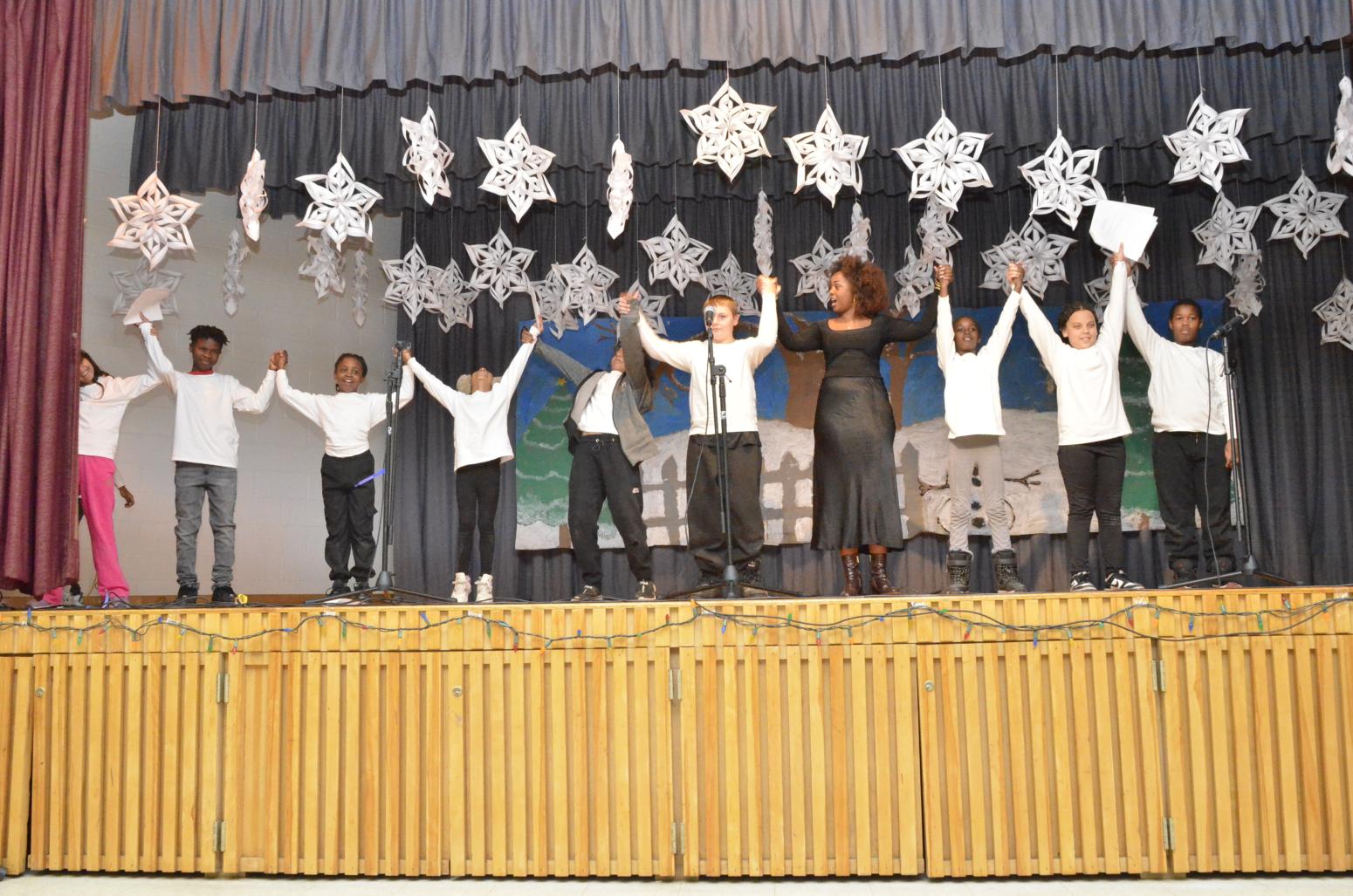Bringing theatre to Danzig
The Stage Program uses drama and play to build confidence and emotional wellbeing in children.
When Community Services Coordinator Diandra Greaves and educator Faduma Mohamed designed The Stage Program, they intended to help youth deal with the unresolved trauma and aftermath of violence. Faduma’s experience in the classroom, coupled with her experience in spoken word, playwright and acting made her a perfect partner for Toronto Community Housing.

The Stage Program’s co-founder, Faduma Mohamed (woman in Black dress) and psychotherapist Jahtara Hutchinson (woman with brown sweater), smiling with The Stage Program participants on performance night.
“Back in 2021, Diandra and I were frustrated that there were not enough measures in place to help children and youth navigate violence in their communities,” said Faduma.
Out of this need, Faduma and Diandra created The Stage, a 10-week initiative for children ages 6 to 12. “We created a program that combines wellness and theatre as a way to teach children and youth about mental health,” said Faduma. The Stage helps children learn social, emotional, and mental health skills they might not get access to otherwise. The children are then able to show the skills they learn through drama. The program runs in partnership with the City of Toronto and the Toronto District School Board, which provided the additional funding and space to run it.
“This program was designed to be a portable model where we can be responsive to [incidents] that happen in the community,” said Alex Yeaman, TCHC’s Safer Communities Manager. “Young people need to have support and resources to help them cope with the things they’ve seen in the community.”
When tenant leaders Omega Whyte and Shondelle Reis first learned about The Stage Program, they were excited to bring it to the Danzig community. They believed in the program and its potential impact on the children living there. Shondelle wanted to make a difference in the lives of the children in her community and be part of the change in memory of her son, who tragically passed away due to gun violence.
Omega and Shondelle applied for the City of Toronto’s Community Crisis Response Fund, a one-time fund to support communities impacted by traumatic incidents and community violence. They used the funding to bring The Stage Program to Danzig.

Tenant leaders Omega Whyte (left) and Shondelle Reis (right) share remarks at The Stage Program performance night.
“When violence impacts a community over and over, it is all the children and youth know,” said Shondelle. “They feel the weight of it. I see that the older children tend to get support, but it is often the younger children who are forgotten.”
“I wanted to be part of a program that will uplift children to speak up about their emotions [and help] them make better decisions so they don’t fall into the wrong path. It is about turning the pain into purpose, growth, and healing.”
In December, to close out the 10-week program, the children of Danzig performed “The Mystery of Brader Junior High.” This short play shows how a group of students overcome a conflict and use the power of their voices to support their peers while resisting the temptations of a ghost.
“The play was chosen with great care,” said Shonelle. “It reflects the challenges and triumphs the children experience and provides them [with] a safe space to express themselves.”
To help advise on mental health and wellness in the program, the team brought in Jahtara Hutchinson, a psychotherapist. Jahtara says, “we do a lot of fun activities to help the children understand other emotions such as grief, depression, anxiety, anger, and happiness. Through the program, I have seen the children talk using a fuller vocabulary to express their emotions and feelings.” She adds, “it’s important that kids understand how to regulate their emotions, as they are still growing and forming their identities.”
The City of Toronto’s Community Development Officer, Jerome Leach, agrees with Jahtara. Jerome says that children who participate in The Stage Program have become more confident and express their feelings better. “We have seen the needle move,” he says. “From the City’s perspective, this was a great opportunity to connect with the little ones and hear what the children want and their challenges.”

Curtain call at The Stage’s performance of “The Mystery of Brader Junior High.”
Faduma also noted that the participants’ reading levels had improved by the end of the program.
“Some of the children were struggling with reading. The program provided an opportunity to enhance their reading skills,” she said. “For some of the children who were shy or introverted, this was a great opportunity to come out of their shell.”
By the end of 2024, The Stage program expanded across three communities, serving 35 children and families.
To learn more about the grant program used to fund The Stage Program, visit the City of Toronto’s Community Crisis Response Fund page. If you would like to learn more about The Stage Program or other initiatives led by the Safer Communities team, email VRP@torontohousing.ca.

